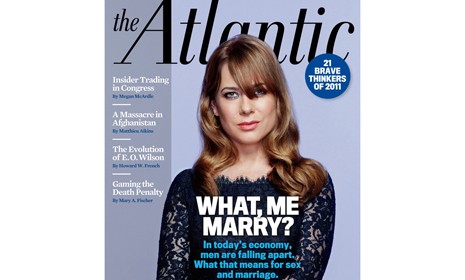The Atlantic's 'Single Ladies' cover story: 6 takeaways
Writer Kate Bolick investigates the state of modern marriage and concludes that women might be better off just staying single

A free daily email with the biggest news stories of the day – and the best features from TheWeek.com
You are now subscribed
Your newsletter sign-up was successful
In her ubiquitous 2008 hit song "Single Ladies," Beyonce tells men, on behalf of unwed women, that they "should have put a ring on it" if they liked "it." Now, in this month's lengthy Atlantic cover story, titled "All the Single Ladies," writer Kate Bolick says that, at age 39, she's perfectly happy ring-free, thank you. Bolick's not alone. More and more American women (and men) are spending more — if not all — of their adult lives unmarried. In her story, Bolick takes a deep look at American marriage in the 21st century, and contemplates whether it's still necessary — or viable. Here, six of the most interesting takeaways from her buzzed-about story:
1. Women don't need husbands the way they used to
The median age at which Americans get married for the first time is 28 for men and 26 for women, writes Bolick. That's up from 23 for men and 20 for women 50 years ago. And in the past 15 years, the percentage of people who are married has dropped from 29 percent to 22 percent. Why? For one reason, women "no longer need husbands to have children," Bolick writes. Forty percent of children are born to single mothers. Adoption and in vitro fertilization are changing the stigma of single motherhood, too. Women have also gained on men in terms of education and employment, making them increasingly less reliant on a husband for financial support.
The Week
Escape your echo chamber. Get the facts behind the news, plus analysis from multiple perspectives.

Sign up for The Week's Free Newsletters
From our morning news briefing to a weekly Good News Newsletter, get the best of The Week delivered directly to your inbox.
From our morning news briefing to a weekly Good News Newsletter, get the best of The Week delivered directly to your inbox.
2. We're in the midst of a "crisis in gender"
Men's economic dominance is "passing into extinction," writes Bolick. And as a result, society may be suffering from what some academics refer to as a "crisis in gender." As women eclipse men in pay, job status, and education, the notion that women should "marry up" becomes irrelevant. Women are the "up," and as men lose their jobs and curtail their education sooner, women are confronted with a "radically shrinking pool of what are traditionally considered to be 'marriageable' men."
3. A lot of men are deadbeats or players
In societies in which women outnumber men, posits one popular theory, men become promiscuous and commitment-averse. While the numbers of men and women are essentially equal in the U.S., "marriageable" women outnumber "marriageable" men and, as such, those men seek out multiple partners and are unlikely to settle down. "We're contending with a new 'dating gap,'" Bolick says, "where marriage-minded women are increasingly confronted with either deadbeats or players." Perhaps, she says, women are better off staying single than settling for men who aren't "marriageable."
A free daily email with the biggest news stories of the day – and the best features from TheWeek.com
4. Women are widening their search for men
As women gain financial independence and marriage becomes "an option rather than a necessity," women are freer than ever to seek out what's called a "pure relationship" — one in which "intimacy is sought in and of itself and not solely for reproduction." Statistics show that women are dating younger men, less wealthy men, and even shorter men simply because these men make the women happy — not because they would make good husbands and fathers.
5. Open marriages are more common
Unconventional arrangements — ranging from the rise of gay marriage to polygamy — are causing some heterosexuals to question their own conventions, embracing open marriages or turning a blind eye to cheating, Bolick asserts. The "two hallmarks of contemporary marriage" are evolving: Monogamy and candor. This may not be so surprising, considering that societal change is typically the greatest during periods of "extraordinary economic flux," such as the one we're in.
6. The stigma of the "single woman" may soon fade
Not that long ago, single-sex hotels and boarding houses offered support groups for girls who did not rely on men, husbands, or family for their well-being. In Amsterdam, Bolick found a modern-day version of such a 19th century boarding house where women live in single rooms in community with each other. Though they're allowed partners and boyfriends, the men aren't allowed to spend the night. It's an idea that might well resurface in the U.S., Bolick writes: "A place where single women can live and thrive as themselves."
-
 The 8 best TV shows of the 1960s
The 8 best TV shows of the 1960sThe standout shows of this decade take viewers from outer space to the Wild West
-
 Microdramas are booming
Microdramas are boomingUnder the radar Scroll to watch a whole movie
-
 The Olympic timekeepers keeping the Games on track
The Olympic timekeepers keeping the Games on trackUnder the Radar Swiss watchmaking giant Omega has been at the finish line of every Olympic Games for nearly 100 years